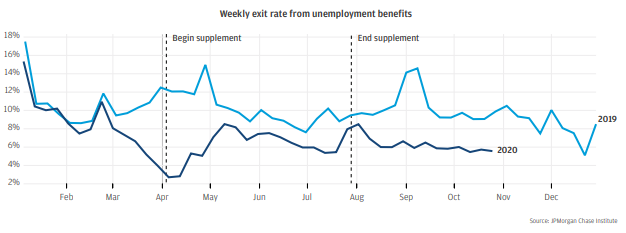
Today, the #JPMCInstitute released a new insight documenting the impact of supplemental UI benefits on job finding, spending, and saving of jobless workers btwn April-July 2020. We find little evidence that it discouraged people from returning to work. 1/6 jpmorganchase.com/institute/rese… 

Job finding for UI benefit recipients showed no sustained increase after the $600-per-week federal supplemental UI benefit expired. Furthermore, we observe that more than half of jobless workers who received the $600 supplement returned to work before the supplement expired. 2/6
Among jobless workers receiving benefits in Oct, roughly half are facing long-term unemployment, and many are facing repeat unemployment. Labor market prospects for this segment have been especially impacted by the economic effects of the pandemic, warranting continued relief 3/6
Finally, spending & saving of jobless workers have been strongly correlated w/ availability of supplemental UI during the pandemic. We estimate that for every $1 of supplemental UI the median unemployed family has spent btwn 29 - 43¢ more than they otherwise would have. 4/6
These findings suggest jobless benefits & supplemental UI played an important role in maintaining household spending & wider macroeconomic stability but likely had limited impact on job search – important for policymakers considering extended benefits deadlines. 5/6
Read the brief and its companion academic piece by co-authored with @Dan_M_Sullivan @p_ganong @pascaljnoel @maxliebeskind @JoeVavra here: jpmorganchase.com/institute/rese… 6/6
• • •
Missing some Tweet in this thread? You can try to
force a refresh


